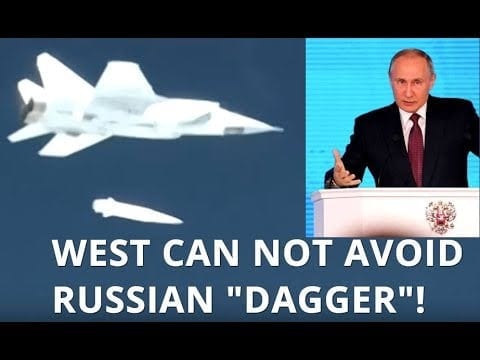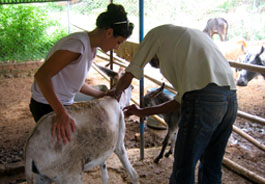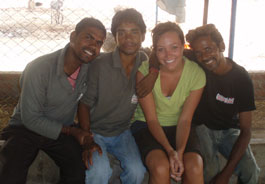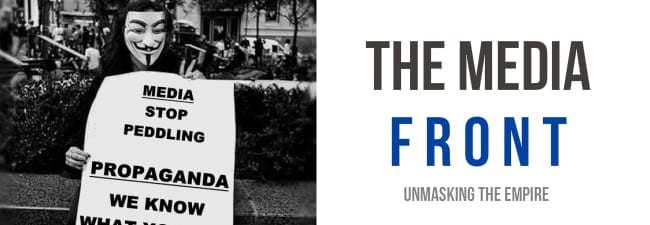Reply to Paul Craig Roberts’ crucial question
ORIGINALLY PUBLISHED ON THE SAKER
 [This article was written for the Unz Review]
[This article was written for the Unz Review]
In a recent article, Paul Craig Roberts directly asked me a very important question. Here is the relevant part of this article (but please make sure to read the full article to understand where Paul Craig Roberts is coming from and why he is raising this absolutely crucial issue):
Andrei Martyanov, whose book I recently reviewed on my website, recently defended Putin, as The Saker and I have done in the past, from claims that Putin is too passive in the face of assaults. https://russia-insider.com/en/russia-playing-long-game-no-room-instant-gratification-strategies-super-patriots/ri24561 As I have made the same points, I can only applaud Martyanov and The Saker. Where we might differ is in recognizing that endlessly accepting insults and provocations encourages their increase until the only alternative is surrender or war.
So, the questions for Andrei Martyanov, The Saker, and for Putin and the Russian government is: How long does turning your other cheek work? Do you turn your other cheek so long as to allow your opponent to neutralize your advantage in a confrontation? Do you turn your other cheek so long that you lose the support of the patriotic population for your failure to defend the country’s honor? Do you turn your other cheek so long that you are eventually forced into war or submission? Do you turn your other cheek so long that the result is nuclear war?
I think that Martyanov and The Saker agree that my question is a valid one
First let me immediately state that I do find this question valid, crucial even, and that is a question which I have been struggling with for several years now and that still keeps me up at night. I think that this question ought to be raised more often, especially by those who care for peace and oppose imperialism in all its forms and I am grateful to Paul Craig Roberts for raising it.
Second, considering the overall nastiness of so much of the pro-Russian blogosphere and so-called “alternative media”, I want to go on record by saying that I have the utmost respect for Paul Craig Roberts, especially for his remarkable courage and intellectual honesty. At times I might not agree with everything Paul Craig Roberts writes, but I never forget that he is most definitely a real American patriot and a true friend of Russia. I consider him a precious ally in my own struggles.
Having clarified this, let me turn to Paul Craig Roberts’ question.
First, I will begin by questioning the very premise of this question and ask whether it is true that Russia has a policy of “turning the other cheek”?
In my opinion, that is a mistaken assumption. For one thing, Russia does not have “a” foreign policy, but several very different policies towards different countries and situations. I won’t list them all here, but I will mention two which are most often mentioned in this context: Syria and the Ukraine.
These are dramatically different conflicts with profoundly different characteristics:
| Syria | The Ukraine | |
| Risk of direct superpower confrontation between Russia and the USA | Yes | No (only indirect) |
| Risk of a local incident escalating into a full scale and nuclear war | High | Very low |
| Proximity to the Russian border | No | Yes |
| Overwhelming force advantage | US/CENTCOM/NATO | Russian military |
| Presence of a large Russian population | No | Yes |
| (Russian) Popular mandate for the use of force if needed | Supportive but cautious (not a blank check) | Strong (in case of Russian counter-attack to save Novorussia) |
| Risk of political blowback if Russia is forced to escalate or intervene | Limited (the EU has more or less accepted that Russia is in Syria, and even the US and Israel have) | Very high (in the EU) |
| Russian intervention justifiable under international law | Yes, self-evidently | Yes, but not self-evidently |
| Major economic and social consequences (for Russia) from the conflict’s outcome | No | Yes |
| Is Russia pressed for time to resolve this conflict? | No | No |
As you see, out of 10 characteristics the conflicts in the Ukraine and Syria have only one thing in common: that Russia is under no time pressure to resolve them. In fact, I would argue that time is very strongly playing to the advantage of Russia in both conflicts (note that I did not say that the local populations in the Ukraine and Syria are in the same position as Russia – for them every passing day is a nightmare).
The two most important comparative characteristics are the risk of the conflict escalating into a full scale and direct superpower confrontation which, by itself, could easily escalate into a nuclear war. This is most unlikely in the Ukraine and very possible in Syria.
Why?
Just look at the current stand-offs taking place in the two countries: in the Ukraine the Novorussians are warning of a concentration of Ukronazi armor near Mariupol; in Syria the Russian Navy and Aerospace Forces are poised to sink USN ships if given the order. See the difference in magnitude and quality?!
For these reasons I believe that we need to look at the Russian stance in these two conflicts separately.
Syria
I have written a lot about the Russian stance in Syria and I will therefore only provide a short bullet-point type summary
- The conflict in Syria places in very close proximity Russian and US forces. Furthermore, the Russian military task force in and near Syria is very small and cannot resist against a determined US/CENTCOM/NATO attack. If attacked, the Russians will rapidly have to use their long-range cruise missiles which are based (or in port) in Russia. What will the US do if that happens?
- There is no reason whatsoever to believe that the US side will react rationally (or even proportionally) if US bases or ships are destroyed in a Russian counter-attack: the political pressure to “teach the Russians a lesson”, to show that the US “has the greatest military in history” and all the rest of the typical US flag-waving nonsense will force Trump to show that he is the MAGA-President. The current US elites are not only “non-agreement capable”, but they are also ignorant, stupid, arrogant, and they also have an immense sense of self-righteousness, a messianic ideology and a religious belief in total impunity. To assume that the US is a “rational actor” would be highly illogical and, in the case of a possible nuclear war, completely irresponsible.
- Vladimir Putin was elected by the Russian people to protect and preserve their interests, not the interests of the people of the Ukraine or Syria. First and foremost, his main obligation is to protect the people of Russia and that, in turn, means that he must do everything possible to avoid a superpower confrontation from which the people of Russia would immensely suffer.
I personally fully support the Russian decision to intervene in Syria, but I have been very worried about the dangers inherent to such an operation from day 1. So far, I believe that the Russians have done a superb job: they have saved the Syrian people from the Takfiri nightmare, they have made it possible for the Syrian government to survive and liberate most of the Syrian people, and they have comprehensively defeated the plans A, B, C, D, etc. of already two (rather nasty, if incompetent) US Administrations. So far, the Russian intervention in Syria is a stunning success. This is also why the US Americans are so desperate for anything which would look like a “victory” for the “greatest nation on earth”, “land of the free, home of the brave” bla, bla, bla… And yet, for this Russian operation to become a real success Russia must do all she can to simultaneously increase the potential costs of intervention for the AngloZionists while denying them any political rewards of a US/Israeli attack. I would not call this “turning the other cheek” but rather I would refer to it as “absorbing blow after blow (especially when the “blows” are ineffective to the point of being almost totally symbolic ones!) until your opponents run out of steam while changing the reality on the ground“. Compare the situation in Syria 2 years ago and today, and tell me: who is winning this one?
The only possible conclusion is that, at least so far, the Russian policy towards Syria has been an immense success.
Now let’s look at the conflict in the Ukraine
The Ukraine
Here, I must confess, I am much more dubious. First, while I understand that this was a tough call, I have to admit that I still wonder whether it was the right thing to do to recognize the Ukronazi junta that came to power in Kiev. Why did the Kremlin agree to deal with them when they so clearly came to power as a result of a violent neo-Nazi coup, executed by a small number of hardcore extremists, and in direct violation of an international agreement signed just the day before? If in the EU it is legal to ban swastikas or even “revisionist books” (and jail people for writing them!), how is it that a bona fide Nazi regime which came to power by violence is instantly recognized? Well, we know that the AngloZionist Empire is the pinnacle of hypocrisy, but the recognition of this gang of corrupt and hate-filled thugs by Russia raises a lot of very disturbing questions. Finally, how hard was it for the Russians to see that the only possible outcome from a Nazi coup in Kiev was a civil war? After all, if I, using only open sources could predict the civil war in the Ukraine as early as on November 30th 2013, then surely the immense and highly competent Russian intelligence community had come to the same conclusions many months and even years before I did! So why did the Kremlin recognize a regime which would immediately start a bloody civil war? Again, disturbing questions.
Still, I won’t second-guess the Kremlin since the President and his aides had much more information upon which to take their decision than I do, even now in hindsight. I am much more bothered by the lack of Russian economic sanctions against the Ukraine, especially in the face of an almost never-ending stream of atrocities, provocations and hostile acts. It does appear that following the Ukronazi acts of piracy in the Sea of Azov, the Russians have finally decided that enough is enough and that the Ukros need to pay a high price (in economic terms) for their acts of piracy. But that is very little very late. What will it take to really get Russia serious? A bloody Ukronazi terrorist attack in Russia maybe?
Now, following the murder of Alexandr Zakharchenko, an increasing number of Russian politicians and public figures are calling for the recognition of the DNR and LNR by Russia. Frankly, I can only agree with this. Enough is enough, especially since there is nobody to negotiate with in Kiev, and there won’t be for the foreseeable future. Furthermore, the junta in power needs to pay for its constant provocations and I believe that Russia should slap some severe economic sanctions on the Ukronazi leaders and on the Ukraine itself. Just look at these two facts and tell me if you also see a problem here:
- The Russian FSB (whose investigators are in Donetsk) has declared that the Ukrainian SBU is behind the murder of Alexandr Zakharchenko
- Russia is the biggest economic investor in the Ukraine
Does that make sense to you?!
[dropcap]A[/dropcap]s for the Minsk Agreements, which were stillborn anyway, the Ukronazis have proven in words and in deeds that they have no intention whatsoever to implement them. I understand that the decision-makers in the Kremlin also realize that and that their goal is not to wait and hope for the Ukros to begin implementing these Agreements, but to use these Agreements as a “hook” to keep slowly weakening the regime in Kiev. Likewise, I do see the advantage of not recognizing the LNR/DNR: just like the USA created an anti-Russia in the Ukraine, so did the Russians create an anti-Ukraine in the Donbass. However, I think that this strategy has now outlived its usefulness and that the protection of the people of the Donbass should be considered more important than the weakening of the Nazi regime in Kiev. And yet, the spokesman for Vladimir Putin has just declared (yet again) that:
“After the perpetration of this terrorist attack it is very difficult to discuss anything with the Ukrainian side, but this does not mean that Russia is withdrawing from the Minsk process.”
Does that make sense to you?!
If/when the Russian military openly intervenes in the Donbass (like it did in Crimea) there is absolutely nothing the Ukros, NATO, the EU or the US will be able to do about it. This is not Syria and here the Russians have a huge, overwhelming, military advantage.
[Sidebar: this is why in military terms, all this “surrounding” of Russia by US/NATO military bases is nonsensical. As are the Baltic/Polish requests to host US/NATO bases on their territory. Modern superpower conflicts won’t really have frontlines and rears but are mostly fought throughout the depth of the theater of war. By placing US/NATO bases so close to Russia the Empire only makes the list of Russian weapons systems which can strike them longer and longer, resulting on more firepower and more redundancy for the Russian attack. This entire “encirclement” business is typical Neocon ideological nonsense. My favorite one? When the USN sails ships into the Black Sea where the survival time of any ship is measured in minutes once the Russians decide to sink it. Ditto for the Persian Gulf which is a terrible place to send USN ships, by the way. Should the Empire order a strike on Iran, it would probably begin by flushing all the USN ships out of the Persian Gulf (unless the Pentagon wants a tripwire force or a repeat of the “Liberty” false flag operation as pretext for attack)]
Not only will the Ukroarmy cease to function as a fighting force in 24-36 hours (most men will survive, by the way, but as combat subunits and units the Ukroarmy will cease to exist), but NATO will be in no position whatsoever to intervene. There is no risk of escalation in the Donbass, especially not a nuclear one. However, unlike Syria, any overt Russian intervention in the Donbass will have immense political consequences in Europe: all the tiny timid baby-steps that were taken by EU leaders to have some kind of independent foreign policy (I think of North Stream 2 for example) will be immediately crushed by a huge chorus of Russophobic hysteria coming out of AngloZionist puppet regimes in eastern Europe.
Truth be told, so far the Russian policy of sending equipment (the Voentorg) and specialists (the North Wind) has been very successful. The Russians managed to defeat the Ukronazis without direct intervention (with some minor exceptions like a few special ops, a few artillery strikes and some help to create a de facto air exclusion zone over the Donbass). The problem is that with Poroshenko being so unpopular and the Ukraine becoming a failed state (which it has been for a while already), the junta could well decide to attack again with (at least on paper) a re-organized, re-trained, re-equipped and much beefed up military force. And if they lose to the Novorussians – which they mostly likely will – then they can blame all their own self-inflicted disasters on Russian military intervention.
Finally, as I have written in the past, the big problem is that the AngloZionists risk very little in telling their Ukronazi proxies to attack Novorussia. Oh sure, a lot of Ukrainians will die, but the AngloZionists don’t care, and if the Ukroarmy is capable enough to force a Russian military intervention, then the Empire wins politically. The only bad scenario for the Empire would be for the LNR/DNR forces to be able to defeat the Urkos for a third time, again without any overt Russian intervention, which is a distinct possibility.
From a Russian point of view, I understand that an open intervention in the Donbass would be very costly in political and economic terms. However, I do believe that it is not an ‘all or nothing’ situation. Russia does not have to choose between doing nothing and sending her tanks into Kiev. Russia does have the option of tightening the screws on Kiev without going overboard. At the very least, Russia could implement painful economic sanctions. The Kremlin could also tell the regime in Kiev that there are red lines (including terrorist attacks in Novorussia, Crimea, or elsewhere in Russia), which should not be crossed and that Russia will not stand by for any Ukronazi provocation.
In conclusion of this section, I will say that the Russian policy towards the Ukraine has been a mixed bag with some real successes mixed in with some probably less than ideal responses. I believe that the Kremlin ought to consider political and economic means to retaliate against the Ukronazi policies while staying clear of any overt military operation for as long as possible (i.e., that is unless the Urkonazis threaten to over-run Novorussia).
Having compared and contrasted these two conflicts, let’s now look at the bigger picture. After all, Paul Craig Roberts is speaking about the future of our entire planet with his question: “Can War Be Avoided and the Planet Saved?”. And he is absolutely correct: what is at stake here is not just the outcome of a local or regional conflict, but the future of our entire planet.
The bigger picture: the existential war between Russia and the Empire
The USA and Russia have been at war for several years now. Yes, this war is roughly 80% informational, 15% economic and only 5% kinetic. But this can change very rapidly. The main reasons for this war are not just the usual mix of grand power rivalries, economic and financial struggles, the desire to control raw materials or strategic geographical locations. These are all present this time too, but the deeper reason for this war is that Russia and the USA represent two mutually exclusive civilizational models. Very succinctly, Russia wants a multi-polar world in which each country is free to develop as its people see fit and in which international law regulates relations between nations. The Empire stands, well, for itself, of course. Meaning that it wants a single world hegemony ruled by the AngloZionists. Furthermore, Russia stands for traditional moral and spiritual values whereas the Empire stands for greed, globalism and the destruction of all traditions and moral values. It is pretty self-evident that these two systems cannot coexist. They present existential threats to each other. Russia will either become sovereign or enslaved. The Empire will either control the planet or crumble. Tertium non datur.
The Russians fully understand that, as do the leaders of the transnational AngloZionist Empire. You think that I am exaggerating? Well, see for yourself what Homeland Security Secretary Kirstjen Nielsen had to say on this topic: (emphasis added)
We are witnessing historic changes across the entire threat landscape … The balance of power that has characterized the international system for decades has been corroding. America’s unipolar moment is at risk. Power vacuums are springing up across the globe and are quickly filled by hostile nation-states, terrorists and transnational criminals. They all share a common goal: They want to disrupt our way of life — and many are inciting chaos, instability and violence
Except for the totally hypocritical comment at the end about “chaos, instability and violence” (which are, by far, the biggest US exports), she is spot on. Hence the current tensions.
There is the very real possibility that this war will suddenly become 100% kinetic. The Russians also understand that, and this is why they have been preparing for WWIII for several years now. As I have already stated many times, the US armed forces are in no condition to fight a conventional war against Russia, and the recent Russian advances in military technology have pretty much rendered the US Navy and Air Force more or less useless. The US nuclear triad, however, is still fully functional and is more than sufficient to destroy Russia.
Russia has therefore also dramatically increased her strategic deterrence capabilities and in effect rendered all the US ABM efforts useless. Following the old motto si vis pacem, para bellum, Russia has now developed an entire family of new weapons systems designed to deter the US from any attack (see Andrei Martyanov’s analysis here and my own here). Putin’s plan is quite evident: he hopes that Russia will be able to convince the leaders of the United States that an attack on Russia would be suicidal. Now all Russia can do is try to do everything in her power to avoid such a conflict.
Paul Craig Roberts presents us with a very bleak picture when he says that:
The people in the West with whom he is dealing are idiots who do not appreciate his statesmanship. Consequently, each time Putin turns the other cheek, so to speak, the insults and the provocations ratchet upward (…) The reason I think Putin needs to do a better job of standing up to Washington is that I think, based on history, that appeasement encourages more provocations, and it comes to a point when you have to surrender or fight.
Sadly, I can only totally agree with Paul Craig Roberts, and I explained that in my article Each “Click” Brings Us Closer To The Bang!” which I concluded with the following words:
I can’t ignore the fact that each “click” brings us one step closer to the “bang.” And that suggests to me that the only real solution to this perilous situation is to find a way to remove the finger pressing on the trigger or, better, take away the gun from the nutcase threatening us all with it.
This is, I think, the core of the Russian policy towards the United States: trying to find a way to get the AngloZionst finger off the US nuclear trigger. This is a difficult and complicated task which can only be tackled very carefully, one step at a time. And yes, this strategy does imply that, at times, they seem to meekly “turn the other cheek” when in reality they are trying not to give the nutcase a reason to open up.
[dropcap]T[/dropcap]hink of it this way: what is the biggest mistake the USA is currently making? The US leaders do not realize (or, worse, do not care) that US actions are pushing Russia into a corner from which she cannot retreat. They are thus forcing Russia to stand her ground including, if needed, by military force. What would be the point of the Russians doing precisely the same thing, pushing the Neocons into a corner from which they would perceive that they cannot retreat? Please keep in mind that understanding what is unacceptable to your enemy (to reach the “breaking point” in negotiations theory) does not at all imply that you agree with your enemy’s values or point of view. We don’t have to find the AngloZionist messianic ideology and worldview as anything but repugnant and delusional to understand the fact that if openly and directly challenged the AngloZionists will strike out, most likely in a completely irresponsible and even suicidal manner. Thus the only possible strategy is to slowly weaken the Empire without ever giving its leaders the unambiguous signal that what Russia is really seeking is their complete demise. And, again, if that means giving them the illusion that Russia is “turning the other cheek”, then that is the price to pay to buy more time and further weaken the Empire.
That strategy, however, cannot be sustained forever, if only because appeasement does invite further abuse. Each time Russia successfully avoids WWIII the imbeciles in Washington DC interpret this as a further sign that “Russia is weak, and we are strong, we are the best, we are invincible!” and plan a further escalation of tensions and hostilities.
This is why I think that each conflict needs to be looked at on a case by case basis. In Syria, appearing to be “turning the other cheek” to avoid WWIII makes sense. In the Ukraine where such a risk does not exist, this strategy needs to be fundamentally reassessed. In Syria, Russian and US forces are in direct proximity, facing each other; in the Ukraine, however, the Ukronazi forces are a proxy for NATO, and thus they act like a buffer which reduces the risks of rapid uncontrolled escalation. Russia can use that to her advantage.
I also want to add this: should Russia decide to push-back in a more energetic manner, she will not do that across the board, but only in specific instances and specific conflicts. A stronger push-back in Syria will not automatically signal a stronger push-back in the Ukraine, and vice-versa. Russian military strategy places great importance on the concentration of forces on the main axis of attack, not across the entire battle area and so do Russian politicians. This entire notion of “being tough on” (crime, drugs, terror, etc.) is very US American. Russians don’t think this way at all. They will study the full disposition of the enemy and pick the one spot where a (counter-) attack makes most sense. So don’t expect Putin to suddenly stop “turning the other cheek” and “get tough with the Americans”. It simply won’t happen this way. In some spots the Russians will appear to give in, while in others they will increase the pressure. That is how all wars are won.
The internal factor: the 5th columnists
[dropcap]A[/dropcap]s I have mentioned many times in the past, Vladimir Putin also has to contend with a pro-Western and pro-Zionist 5th column inside the Kremlin and, more generally, inside the state apparatus. I call this 5th column the Atlantic Integrationists (as opposed to the Eurasian Sovereignists), but we could also call them the Washington Consensus/IMF/WTO/WB/etc/ or follow the example of Gary Littlejohn and call them “supporters of international financial institutions” (except that rather calling them “supporters” I would refer to them as “agents”). But whatever term we choose to use, it is crucial to always keep in mind that this 5th column remains the biggest threat Putin and Russia are facing and Putin has to keep that in mind in every decision that he makes. So far, these 5thcolumnists have focused mostly on what is dear to their hearts – money issues and internal politics – and left the military and security services to deal with what is dear to their hearts: the protection of Russian sovereignty and foreign policy. But you can be sure that if Putin ever makes a mistake (or even if he doesn’t, but only appears to make one) they will pounce on him and do everything they can to either outright oust him or, at least, force him and his supporters to agree to their treacherous agenda: to return to the nightmare of the 1990s: a total sellout of Russia to the AngloZionists.
Conclusion: simple perceptions vs a complex reality
So is Russia acting like a bully (like the US/EU say), or adequately responding when needed (as most Putin supporters believe) or does she meekly turn the other cheek (as Paul Craig Roberts concludes)? I would say that none of these characterizations are correct and that the reality is just far more complex.
For one thing, the examples of South Ossetia and Crimea show that Putin is willing, when needed, to take forceful military action. But in other cases, he prefers to delay any confrontation. In the case of Syria, this makes sense. In the case of the Ukraine, less so. Furthermore, Russia is still only a partially sovereign country and the power of the 5th columnists still strongly influences Russian decision making, especially in non-time-critical cases (South Ossetia and Crimea being perfect examples of a time-critical situation). This is why Russian actions often appear as contradictory zig-zags (even when they are not). Russians also still have a rather weak public relations capability (for examples, see here, here and here)
This perception problem is made worse by the regrettable fact that much of the English language Russia-focused blogosphere has been roughly split:
- On the one hand, mindless cheerleading combined with emphatic denials that there are any problems at all.
- On the other hand, defeatist “all is lost” or “Putin sold out” kind of commentary only serving to confuse the matter further.
They are all equally wrong. Worse, they both damage Russia in general and Putin in particular (sadly, most of them have sold out to their financial sponsors and are more interested in pleasing this or that oligarch than about being truthful).
Russian policies should be viewed dialectically: as evolving processes which often contain the seeds of their own contradiction, but which still end up being tremendously successful at the end, at least so far. Rather than hoping for perfection or infallibility from Putin, we should offer him our conditional and critical support. In fact, I would even say that Putin and the Eurasian Sovereignists can greatly benefit from critical support as this gives them a justification to take corrective action (for example, Putin has already amended, albeit minimally, the proposed pension reform project as a direct result of a massive public outcry). You could also put it this way: each time the Russian public opinion is outraged by Ukronazi actions or the perception that Russia is meekly turning the other cheek brings closer the day when Russia will finally recognize the two Novorussian republics. Right now what I hear a lot in the Russian media (including state media) are expressions of immense frustration, disgust and anger and calls for the Kremlin to take a much harder line on the Ukros in Kiev. Popular anger is a powerful weapon which Putin can use against his enemies, both internal and external.
So let us follow Paul Craig Roberts’ example and continue to ask the hard questions and remain critical of Russian policies.
—The Saker
Links to responding documents in this discussion thread:
Russia As a Cat – Andrei Martyanov replies to Dr Paul Craig Roberts
What Should Putin Do? – Dr Roberts replies to Andrei Martyanov
I Agree with The Saker as Far as he Goes – Dr Roberts replies to The Saker

This work is licensed under a Creative Commons Attribution-NonCommercial 4.0 International License
 In his zeal to prove to his antagonists in the War Party that he is as bloodthirsty as their champion, Hillary Clinton, and more manly than Barack Obama, Trump seems to have gone “play-crazy” — acting like an unpredictable maniac in order to terrorize the Russians into forcing some kind of dramatic concessions from their Syrian allies, or risk Armageddon.However, the “play-crazy” gambit can only work when the leader is, in real life, a disciplined and intelligent actor, who knows precisely what actual boundaries must not be crossed. That ain’t Donald Trump — a pitifully shallow and ill-disciplined man, emotionally handicapped by obscene privilege and cognitively crippled by white American chauvinism. By pushing Trump into a corner and demanding that he display his most bellicose self, or be ceaselessly mocked as a “puppet” and minion of Russia, a lesser power, the War Party and its media and clandestine services have created a perfect storm of mayhem that may consume us all.— Glen Ford, Editor in Chief, Black Agenda Report
In his zeal to prove to his antagonists in the War Party that he is as bloodthirsty as their champion, Hillary Clinton, and more manly than Barack Obama, Trump seems to have gone “play-crazy” — acting like an unpredictable maniac in order to terrorize the Russians into forcing some kind of dramatic concessions from their Syrian allies, or risk Armageddon.However, the “play-crazy” gambit can only work when the leader is, in real life, a disciplined and intelligent actor, who knows precisely what actual boundaries must not be crossed. That ain’t Donald Trump — a pitifully shallow and ill-disciplined man, emotionally handicapped by obscene privilege and cognitively crippled by white American chauvinism. By pushing Trump into a corner and demanding that he display his most bellicose self, or be ceaselessly mocked as a “puppet” and minion of Russia, a lesser power, the War Party and its media and clandestine services have created a perfect storm of mayhem that may consume us all.— Glen Ford, Editor in Chief, Black Agenda Report







 September 7, 2018
September 7, 2018







